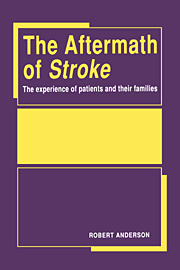Book contents
- Frontmatter
- Contents
- Acknowledgements
- Chapter 1 Stroke: An introduction to the problem
- Chapter 2 The Greenwich stroke study
- Chapter 3 Coming into medical care: the first month after stroke
- Chapter 4 Hospital care and rehabilitation
- Chapter 5 Survival, physical disability and health
- Chapter 6 Support in the community
- Chapter 7 The effects of stroke on social, family and personal life
- Chapter 8 Caring and coping with stroke
- Chapter 9 Resources for coping with stroke
- Appendix: Measurement and scoring of variables
- References
- Index
Chapter 9 - Resources for coping with stroke
Published online by Cambridge University Press: 07 October 2011
- Frontmatter
- Contents
- Acknowledgements
- Chapter 1 Stroke: An introduction to the problem
- Chapter 2 The Greenwich stroke study
- Chapter 3 Coming into medical care: the first month after stroke
- Chapter 4 Hospital care and rehabilitation
- Chapter 5 Survival, physical disability and health
- Chapter 6 Support in the community
- Chapter 7 The effects of stroke on social, family and personal life
- Chapter 8 Caring and coping with stroke
- Chapter 9 Resources for coping with stroke
- Appendix: Measurement and scoring of variables
- References
- Index
Summary
This book has sought to describe and illuminate the experiences and attitudes of stroke patients and their carers. It looks at the meaning of the illness for the everyday lives of those affected; it reflects the reality of a life-threatening condition of sudden onset, which may shatter personal images, family life and future ambitions. There has been a serious gap in our knowledge of coping with stroke from the perspectives of patients and carers rather than from that of medical and other service providers. Yet a sound, effective and ethical approach to stroke must lie in awareness of and attention to the experiences, values, priorities and expectations of patients and their carers – they are the people who live with the consequences of the illness and who shoulder its burdens.
Like all chronic illnesses, stroke represents an assault upon many areas of everyday life, and, as the results of the study reported here show, the nature and extent of the problems change over time since onset of the illness. These events are worked through in an environment which differs for each patient, with variations in the important resources of family, money, housing, health care and other services. In addition, the activities and performance of the people involved – patient, family, therapists, doctors – affect each other, so that in this complexity it is impossible to predict the experience of any individual patient.
- Type
- Chapter
- Information
- The Aftermath of StrokeThe Experience of Patients and their Families, pp. 217 - 233Publisher: Cambridge University PressPrint publication year: 1992



